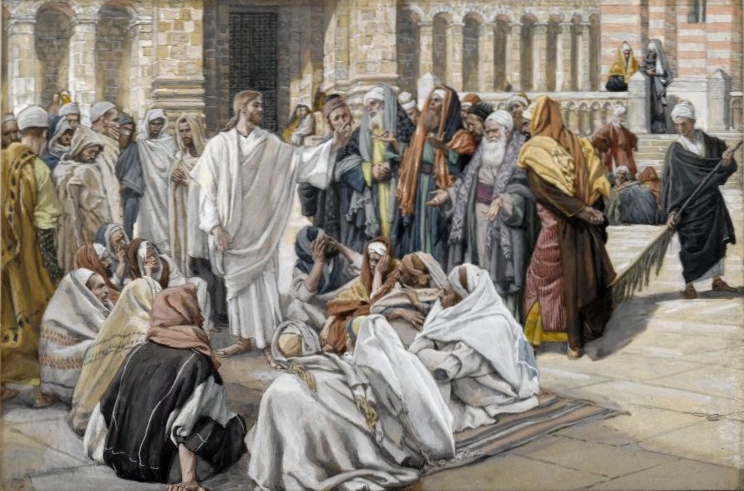Polite Disagreement?
Matthew 21:23-32
Eighteenth Sunday after Pentecost
Analysis by Peter Keyel
23 When he entered the temple, the chief priests and the elders of the people came to him as he was teaching, and said, “By what authority are you doing these things, and who gave you this authority?” 24 Jesus said to them, “I will also ask you one question; if you tell me the answer, then I will also tell you by what authority I do these things. 25 Did the baptism of John come from heaven, or was it of human origin?” And they argued with one another, “If we say, ‘From heaven,’ he will say to us, ‘Why then did you not believe him?’ 26 But if we say, ‘Of human origin,’ we are afraid of the crowd; for all regard John as a prophet.” 27 So they answered Jesus, “We do not know.” And he said to them, “Neither will I tell you by what authority I am doing these things.
28 “What do you think? A man had two sons; he went to the first and said, ‘Son, go and work in the vineyard today.’ 29 He answered, ‘I will not’; but later he changed his mind and went. 30 The father went to the second and said the same; and he answered, ‘I go, sir’; but he did not go. 31 Which of the two did the will of his father?” They said, “The first.” Jesus said to them, “Truly I tell you, the tax collectors and the prostitutes are going into the kingdom of God ahead of you. 32 For John came to you in the way of righteousness and you did not believe him, but the tax collectors and the prostitutes believed him; and even after you saw it, you did not change your minds and believe him.

The Pharisees Question Jesus – James Tissot – From Wikimedia Commons
This new life flips the old life on its head. Faith looks past the sins and into the new life.
Author’s Note: The parable of the wicked tenants follows, wherein the wicked tenants murder the landlord’s son sent to collect from them.
Diagnosis: I Fight Authority, Authority Always Wins
Step 1: Initial Diagnosis (External Problem): Trapped
Jesus waltzes into the Temple and starts teaching. He’s not a priest. He’s not a scribe. He wasn’t invited to the Temple by any chief priests and scribes. It’s not surprising that the priests and scribes want to know what he’s doing and why. Instead of throwing him out, they give them the benefit of the doubt and ask Jesus why he thinks he should be teaching in the Temple.
Instead, Jesus traps them with a question along the lines of “Have you stopped beating your wife?”
Everyone knows the question is rigged so the priests and scribes will lose no matter how they answer. They try to avoid the trap with a humble answer. It lets Jesus dodge the question, but it could have been worse.
Step 2: Advance Diagnosis (Internal Problem): Humiliated
The infuriating part is that Jesus doesn’t relent. His teaching takes aim at the priests and scribes, and now he goes on the offense. The next parable is aimed at humiliating them. The priests and scribes spend their lives in holy vocation, and Jesus is telling the crowds (via questioning them) that they’re defying God. In fact, Jesus is saying that the corrupt tax collectors and prostitutes are more deserving than they are, despite still being tax collectors and prostitutes.
All because they disagreed with John’s approach and claims. Can’t even disagree with crazy locust-eating homeless dudes without getting accosted by riff-raff duped into thinking he was a prophet. Smh.
This is all humiliating. Even worse than this is happening in the Temple. Perhaps if they’d had more presence of mind, they might have asked which part of the Torah instructed one to humiliate people who disagree with you. Or thrown him out when they had the chance instead of engaging in dialogue.
Step 3: Final Diagnosis (Eternal Problem): Kill
Jesus still doesn’t relent. After slandering them as unrighteous for disagreeing with John, Jesus’ next parable accuses them of murder-by-proxy. While that pericope warrants its own text study (next week!), it cuts to the bone of where this disagreement is going: murder because Jesus claims to be God. This final pericope answers the initial question the priests and scribes asked about whose authority Jesus taught by, all while ridiculing the priests and scribes in their own Temple.
Jesus could have answered the authority question more succinctly: “God’s authority, just like John was given. And by-the-way, God thinks you’re the worst pretenders to God’s authority in millennia. You’re doing so bad at this, even the thieving tax collectors and whores are better at it than you.”
Well, killing this pretender claiming to be God and threatening their authority may be a necessary idea after all. Not ideal, but life requires compromises. Good thing there are Romans around to do the dirty work. On the off-chance the priests and scribes are wrong, God will punish those idolators instead.

Upside Down House – Niagra Falls. From Wikimedia Commons
Prognosis: I Fight Authority, Authority Always Wins
Step 4: Initial Prognosis (Eternal Solution): Live
When Jesus dies on the cross, it looks like the priests and scribes were right after all. But something unexpected happens on the third day. Jesus rises from the dead. God’s answer to the challenge of God’s authority is NOT fire and brimstone on the Romans, Jews or any of the others who are wrong. Instead, it is resurrection of the one who was right. This is a change from the expectations, and represents a new way of doing things, centered on life instead of death.
Step 5: Advanced Prognosis (Internal Solution): Glorified
This new life flips the old life on its head. Faith looks past the sins and into the new life. Where the priests may have felt humiliated at being told they were doing it all wrong by not listening to John, they missed the Good News that Jesus gave them. Even when criticizing them, Jesus describes the chief priests and scribes as God’s sons, and says they are going to the kingdom of God. Yes, other sinners are going first. But does it matter who is first to eternity?
Faith enables them to grab hold of the promises Jesus makes and creates the best in them. All the sinners, including the tax collectors, prostitutes, priests, and scribes, are glorified by this faith, separate from their works.
Step 6: Final Prognosis (External Solution): Freed
Where does this faith lead? Into the kingdom of God. We are given the opportunity to reflect our belief in that kingdom with our outward works. We are not trapped by the words of others, and do not need to fear labels others apply, even when accurate. We can acknowledge that we are sinners, tax collectors, prostitutes, etc. The new life further removes the power the old traps once held over us. We know those traps cannot stop the Promising God who has shown us in Jesus’ death and resurrection that we are free to live accordingly.



You must be logged in to post a comment.